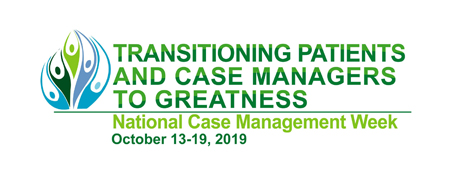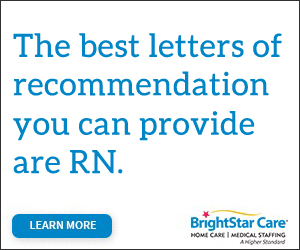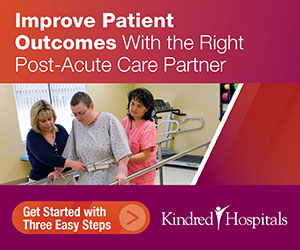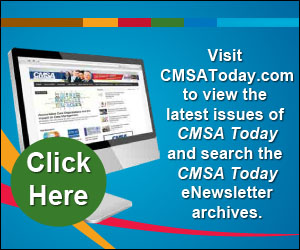|
Our web-based Educational Resource Library, one of many CMSA member benefits, features over 160 continuing education courses available 24/7 with CE credits such as CCMC, RN and ASWB. Join CMSA today and save $20 with promo code EDU90! Visit https://www.cmsa.org/membership/individual-membership/ to view the full article online. |
|
Visit https://www.naylornetwork.com/cmsapulse/articles/index-v3.asp?aid=575550&issueID=64429 to view the full article online. |
On August 22, 2019 at 11 AM CDT, join Janet Coulter, RN, MSN, MS, CCM, for CMSA's CM Spotlight Series for August, "Balancing Personal and Professional Life: Healthy Case Manager Lifestyles." Life is full of unexpected, unplanned and sometimes unwanted events. There are many demands on our time, energy and resources. As case managers, we must attempt to take care of our own physical, mental and emotional well-being as well as those of the people we care for. We sometimes forget about creating balance between our professional and personal life. Balance is necessary to maintain health. Case managers have needs, too. We need to care for ourselves just as we care for all the people in our lives. And we need to give ourselves credit for doing the best we can in one of the toughest jobs there is! This presentation will present ideas on how to maintain a balance between your personal and professional life when you are faced with life’s challenges. CEs: 1 hr CCM Ethics and RN Register today at the link below; have your CMSA.org user name and password ready to log in and complete your registration. If you run into issues please contact cmsa@cmsa.org or call 501-225-2229 for assistance. Visit https://www.cmsa.org/education/education-webinars/ to view the full article online.
|
|
Offering 1.0 hour of credit for CCMC, ACCME, AAPA, AANP, ACPE, and ANCC credits Recent years have brought many updates in the world of asthma. But what does this mean for your patients? Stream this CE-accredited webcast to hear from the experts how you and your team can apply the latest advances in personalized asthma treatment and patient-centered care. Case-based content will allow you to exercise your problem-solving skills for complex patients with moderate-to-severe asthma while picking up some new pointers to ensure that your patients have access to the right therapy at the right time. This activity is provided by PRIME Education. There is no fee to participate. This activity is supported by an educational grant from Sanofi Genzyme and Regeneron Pharmaceuticals.
Visit https://primeinc.org/71wb1811?utm_source=cmsa&utm_medium=email&utm_campaign=asthma&utm_term=71189 to view the full article online. |
Mark your calendars: it's time to start planning your National Case Management Week celebrations! In October 2019, the Case Management Society of America and the greater case management community celebrate National Case Management Week, a time to honor and recognize all professional case managers across the continuum of care. Case management has been practiced for over half of a century, and through that period we have assisted our patients and our clients in developing their plans to move to wellness. And as you support your patients, CMSA supports you. Explore our 2019 CM Week page for guides, products and other resources to help you celebrate the case management industry and spread the word about Case Management Week! Also, connect with other participants on the National Case Management Facebook page at where you can share, brainstorm and collaborate about the week’s activities. Your celebrations will not only promote the industry of case management, but will also show the case managers with who you work how much they're appreciated! Order your CM Week products by September 23, 2019 to ensure receipt. Visit https://www.cmsa.org/chapters/cm-week/ to view the full article online.
|
|
Through its representation, advocacy and education functions, the Case Management Society of America (CMSA) has been an organizing force setting the practice direction for the discipline of case management. CMSA promotes practice that is evidence-based and discourages the use of practices which, though popular or widely accepted, are either not beneficial or are contrary to the CMSA Standards of Practice for Case Management (SoP). While the increasing emphasis on care coordination by providers and payers has opened professional debate regarding the models being used in hospitals today, CMSA intends to clarify its position on hospital case management practice through this white paper initiative and urges hospital leaders to seek solutions that more effectively address the needs of our most vulnerable hospitalized patients. This white paper has been in the works for almost two years through the work of a CMSA task force. The accumulation of their work is ready to share! This white paper is FREE to Members. Non-Members may purchase for $25.00 Visit https://www.pathlms.com/cmsa/courses/12360 to view the full article online. |
|
The CMSA Foundation programs are funded by the heart and soul of the CMSA Members, and funding supports members in return. See what’s happening at the Foundation and how you can help! Visit http://www.cmsafoundation.org/ to view the full article online. |
|
Visit https://www.naylornetwork.com/cmsapulse/articles/index-v3.asp?aid=575538&issueID=64429 to view the full article online. |
|
CMSA's Standards of Practice for Case Management, 2016 revision, provides practice guidelines for the case management industry and its diverse stakeholders. The impetus for the 2016 revision of the Standards is the need to emphasize the professional nature of the practice and role of the case manager. The 2016 Standards of Practice contain information about case management including an updated definition, practice settings, roles and responsibilities, case management process, philosophy and guiding principles, as well as the standards and how they are demonstrated.
Visit http://solutions.cmsa.org/acton/media/10442/sop-2016 to view the full article online. |
|
CMSA is pleased to announce a partnership with Bruce Berger, PhD, of Berger Consulting, LLC to bring you comMIt: Comprehensive Motivational Interviewing Training for Health Care Professionals at a discounted price. This 8-hour online program is centered around motivational interviewing, which is an evidence-based effective method for improving adherence to health behaviors. It was developed specifically for patients who are either ambivalent or resistant to change regarding these health behaviors.
CMSA has really listened to your requests for a practical motivational interviewing course targeted at healthcare professionals and their needs. We are thrilled to bring you an accredited course developed by the foremost authorities of MI in healthcare, Drs. Bruce Berger and William Villaume. There is a limited number of seats for this program, accessible to CMSA members only, so you'll want to act soon! Click below to explore more information and register. Visit http://www.cmsa.org/mi-learning/ to view the full article online. |
|
Pat Stricker, RN, M Ed, Senior Vice President, TCS Healthcare Technologies Debb Keller, RN, CMCN, CCM, CPHQ, Chief Executive Officer, TCS Healthcare Technologies I frequently hear some “older” physicians and nurses complaining about electronic health records (EHRs). They feel they inhibit documentation and are cumbersome and frustrating to use. However, I can’t imagine any of the younger physicians or nurses would ever conceive of working in a system without electronic patient records. As I was beginning to write this article, I began to wonder how many of you even remember the days in which there were no computerized records — when everything was in a written chart that was only accessible to one member of the healthcare team at any one time. I’m sure that must be more than half of you reading this article. For those of you who don’t know what it was like before computerized records, let me give you some insight. Imagine having to submit a list of patients that you were going to see tomorrow in the clinic to the medical records department (MRD) the day before so they could gather the records and bring them to the clinic that morning. Or if you are seeing a patient in the emergency department you would need to call the MRD and ask them to bring the patient’s record to the ED. Until you get the record you would be caring for the patient without having any medical history. And once you are finished with the record it would need to be returned to the MRD for filing or, if the patient was admitted, the record would need to be transferred to the floor with the patient. Visit https://www.naylornetwork.com/cmsapulse/articles/index-v3.asp?aid=575541&issueID=64429 to view the full article online. |
|
by Ellen Aliberti, MS, CCM, RN The statistics that are associated with aging in the U.S. today are staggering enough. The numbers are particularly alarming when you understand that every day 10,000 Americans are turning 65 years of age, and that this phenomenon, often referred to as the Age Wave, will continue until 2025. However, when you add consideration for the functional limitations and disease burden that also characterizes aging, the projections for those who will need ongoing care coordination and long-term care (LTC) supportive services are even more staggering. According to the Centers for Medicare & Medicaid Services (CMS), 70% of people over the age of 65 will need long-term care services.¹ The experience of one long-standing LTC insurance demonstrates the average length of time a person will need LTC is 3.8 years, and, furthermore, the cost of LTC services is anticipated to double in the next 20 years.² Visit https://www.cmsatoday-digital.com/cmsq/1219_issue_5__2019/MobilePagedArticle.action?articleId=1503044#articleId1503044 to view the full article online. |
|
New Medicaid Drug Utilization Review standards build on existing state activities to encourage appropriate use of opioids and other medications On August 5, the Centers for Medicare & Medicaid Services (CMS) released new guidance to states to promote proper use of prescription opioids by updating standard requirements for the Medicaid Drug Utilization Review (DUR) program. The Medicaid DUR program is a two-phase process that screens drug claims to help identify clinical misuse or abuse and examines claims data to identify patterns of abuse. The guidance will help states implement drug use review procedures newly required under the Substance Use-Disorder Prevention that Promotes Opioid Recovery and Treatment for Patients and Communities Act (the SUPPORT Act), so state Medicaid programs can better monitor opioid prescribing and dispensing patterns, including new requirements for states to implement electronic notifications, also known as safety edits. These notifications can alert health care professionals, such as pharmacists, of potential concerns with a medication prescribed for the patient that has to be resolved before it can be dispensed and safely taken by the patient. Source: Centers for Medicare and Medicaid Services Visit https://www.cms.gov/newsroom/press-releases/cms-announces-new-standards-medicaid-dur-programs-combat-opioid-misuse-and-abuse to view the full article online. |
|
Visit https://www.naylornetwork.com/cmsapulse/articles/index-v3.asp?aid=575544&issueID=64429 to view the full article online. |
|
Save the date for CMSA's 30th Annual Conference & Expo in Boston, June 28 - July 3, 2020. Look for additional upcoming updates this summer on the call for presentations, accommodations and registration. Visit http://solutions.cmsa.org/acton/fs/blocks/showLandingPage/a/10442/p/p-00e9/t/page/fm/0 to view the full article online. |





